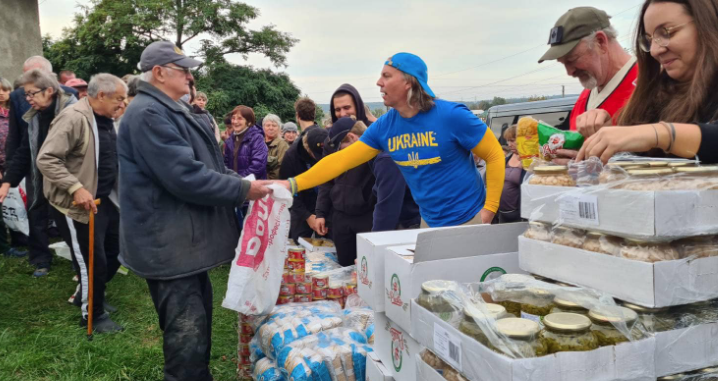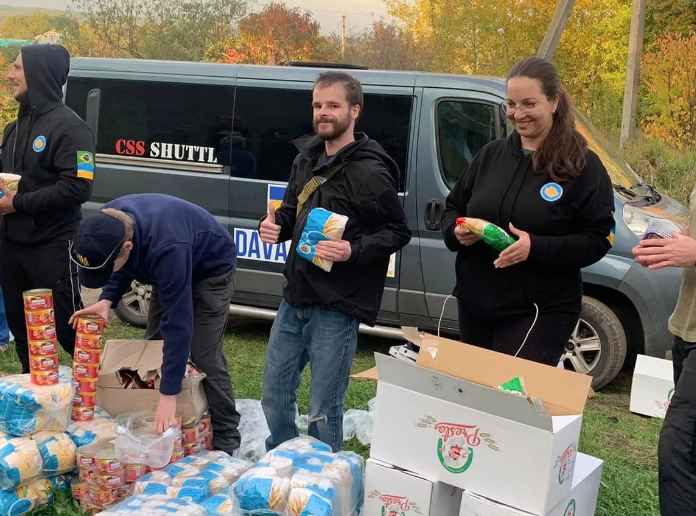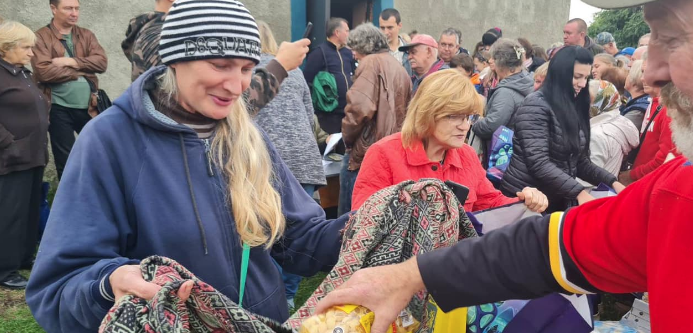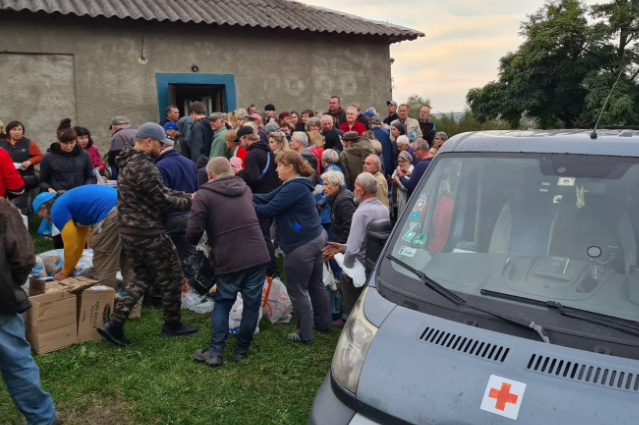By Judy Clabes
NKyTribune editor
Back in March, less than three weeks into Russia’s war of aggression against Ukraine, NKY’s Ben Dusing traveled to Poland to help Ukrainian refugees fleeing their war-torn country en masse. He had to spend his time as a suspended lawyer somehow, and having spent a year of his life as a youth in Russia, he knew the language, was committed to the Ukranian cause, and just thought he could be of some help.

Dusing and Gardner at the airport with bags loaded with vitamins, protein bars, tourniquets, medicines, and more.
He since returned to the tiny town of Medyka, Poland, the epicenter of the worse humanitarian crisis in Europe since World War II, a second time — and with both trips, earned an international reputation first as the guy in the chicken costume and then as “Ben the Bunny,” greeting wary refugees at the border and giving them a reason to smile — and hope.
More, he became a leader among the diverse group of volunteers from all over the world called to the terrific humanitarian outreach for Ukrainians. Thousands of families were displaced, fleeing the barbarianism of the Russian invasion, looking for a safe haven, for their loved ones and for new roots.
“I went because I very much believed in the Ukrainian cause – the cause of freedom and human rights – and because it sure looked like whoever was “in charge” of handling that situation sure could use some help,” said Dusing.
The multi-national group of volunteers organized themselves, shared their own grief and hopes, formed an unbreakable bond — and stayed in touch via the Internet and a private network.
“I became deeply embedded in this volunteer network and devoted to the cause — the welfare of the Ukrainian people,” said Dusing. “The volunteers are people who put their lives on hold and made epic sacrifices to help because they genuinely cared and felt called to do so. I was honored to be accepted as part of such a team.”
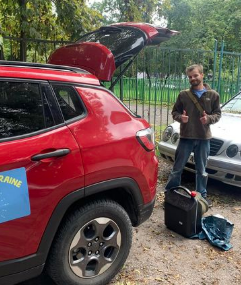
John Garner and the team’s ‘wheels’ loaded with supplies to be distributed to Ukrainians families whose lives have been disrupted by the war.
And that’s how Dusing and his colleague John Gardner were enticed to make another trip — not to the refugee camp, but into Ukraine itself — and deep inside the ‘hot spot’ territories in the east and south where the fighting has been fiercest.
They made careful plans — gathering tourniquets and medicines they collected at home, getting the right safety gear, and listening carefully to their expert advisers as to travel. After flying into Krakow, Poland, they made their way through the refugee camp at Medyka to Lviv, a city near Ukraine’s western border with Poland and staying with fellow volunteers along the way. They rented a vehicle, making their way to Kyiv, Ukraine, the capital of a county still very much at war.
Their destination was Kharkiv, a city 25 miles from the Russian border, where a flat had been arranged for them. The city has been shelled daily since February and is the heart of the successful Ukrainian offensive. This would become their home base.
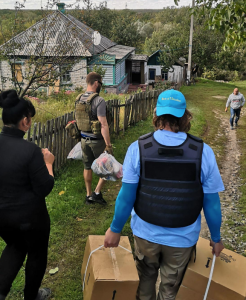
Delivering supplies in Izium.
They connected with experienced volunteers, including Canadian Paul Hughes whose organization H.U.G.S. (Helping Ukraine Grassroots Support), had an established supply network — and who also knew how to navigate the checkpoints and road craters to get to Zaporzhzhia, where Ben and John would help get 50 Ukrainian soldiers everything they needed to get through the winter. It was a 7 1/2 hour drive from Kyiv. This was just one detour — that is, change of plans — on their way to Kharkiv.
For the first time, they experienced — as in teeth- and bone-shaking experience — the shelling that Ukrainians in these villages experience every day. They scrambled for shelter for a jarring night. And they began to see the devastation. They were able to help transport families fleeing the fighting — taking them from volunteer centers to train stations and helping in any way they were needed.
“The difference between what we’re doing now and what I was doing on the previous trips is night and day, and it’s a big adjustment,” said Dusing. “We’re in harm’s way. It’s that simple. The war is real in a way it never was before.
“We’re living in Kharkiv and it’s shelled every day. The complex where our flat is has been shelled. The liberated villages around Kharkiv are literally the front. Our escorts tell us when we are in artillery range of the Russians and our convoy pulls over and we put on body armor . . .
“You have to play through fear. But it’s the most meaningful work I’ve ever done.”
They also connected with Pole Jakub Sochuijko and his unofficial network in Kharkiv. Jakub lived in the subways of the city caring for 100 people through a spring and summer airborne onslaught for 111 days.
They accompanied Alaskan Dane Ferguson in a 4-car convoy — under military-authorized private security — to the villages around the decimated city of Izium near the front. They helped distribute food to people who had no way to get it otherwise. It was the first of many subsequent convoys.
As their own supplies ran out, it was necessary to connect to other supply lines, including with Zuzanna, who is leading a major distribution of World Food Program aid to some of the liberated villages.

Ben the Bunny called to duty.
The Kentucky pair has been in demand from all the volunteer teams because they’ve proven to be hard, dedicated workers, reliable and trustworthy. Dusing is in demand because of his Russian language skills, which he says he has greatly expanded during this trip.
And as they moved around the “liberated” area, they encountered more red tape, security checkpoints — and warnings not to walk in the grass because of land mines and all kinds of booby traps in the former Russian-occupied villages. Nothing is normal in these areas. And the war still rages on.
A couple of days ago, Ben the Bunny made a demand appearance in Visoky, about 30 minutes from Kharkiv, at a home for displaced families, much to the delight of both children and adults.
While most of the humanitarian aid to the area has been primarily driven by independent volunteer groups, aid from larger, established organizations — like the Red Cross, the World Food Bank, and the UN — is starting to show up. There are warehouses throughout the area where volunteers can pick up supplies to distribute. The organizations need the volunteers to help get the supplies out to the villages. So, there’s very little time to rest, and always another convoy to join.
Dusing and Gardner plan to stay a few more weeks, but it’s clear that they see purpose in what they’re doing and in the service they are providing to people who are grateful for it.
